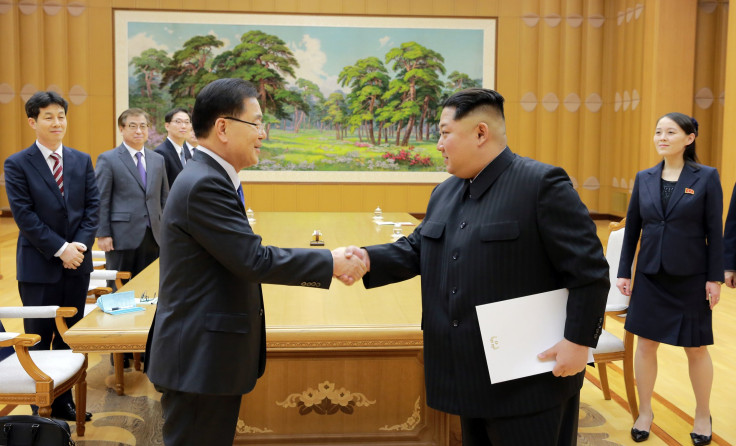North Korea Nuclear Activity: Plutonium Production Likely Resumed Amid Talks With Seoul

North Korea may have resumed production of plutonium for its nuclear weapons program, 38 North, which monitors the reclusive state, said Monday after one of Pyongyang's nuclear reactor showed signs of operation. The report comes as North Korean leader Kim Jong Un and envoys for South Korean President Moon Jae-in met for an "openhearted talk" amid tensions between the Koreas over North's growing nuclear activities.
On Tuesday, the North said it had a "satisfactory" meeting with South Korean officials — the first that took place since Kim took power after his father's death in late 2011. The meeting was also the latest sign that the Koreas are trying to mend ties.
However, 38 North reported Monday that commercial satellite imagery from Feb. 25 showed activity around the 5 MWe reactor at the Yongbyon Nuclear Scientific Research Center.
"A steam vapor plume was observed at the 5 MWe reactor on imagery from both Feb. 17 and 25," the website said. "Such plumes have generally been a useful indicator of reactor operations, however, they were usually accompanied by a cooling water discharge near the river outfall."
"The presence of ice melt on the river supports the conclusion that the reactor is indeed operating and that the outfall pipeline has been extended," according to 38 North. "If the reactor is operating again, as the evidence suggests, it means North Korea has resumed production of plutonium presumably for its nuclear weapons program."
The website warned that pipeline extension could lead to difficulty in monitoring the reactor's operations in the future. An alternative monitoring option would be low-resolution thermal infrared satellite imagery, the report said.
In 2017, Pyongyang staged 16 missile tests, including 11 since Moon Jae-in took office in May. It also conducted its sixth and most powerful nuclear test so far on Sept. 3. Despite tough sanctions and international condemnation, North Korea continued with its nuclear development. It also threatened the United States and South Korea of consequences over the joint military drills that are considered a security threat by North Korea.
While U.S. believes the joint military drills in Seoul are necessary to protect its ally from North Korea's threats, not many are on the same page. On Monday, two anti-American activists were taken into custody after they attempted to charge into the U.S. Embassy in Seoul demanding the allies’ cancel planned joint military exercises.
South Korea's Yonhap News reported, citing police, that the protestors threw leaflets reading, "Permanently end nuclear war exercises for northward invasion."
The U.S. and South Korea had delayed the planned joint military drills last month to encourage North Korea to take part in the PyeongChang Winter Olympics.
However, Monday's meeting between Kim and South Korean officials gave rise to hope that the two nations could focus on how to defuse Pyongyang's nuclear standoff and restart talks.
North Korea's state media said Monday that Kim expressed his desire to "write a new history of national reunification" during Monday night's dinner that lasted for about four hours. After the warm reception from Kim, South Korean delegates plan to hold a follow-up meeting with North Korean officials Tuesday before returning to Seoul. But, it's unclear if the North Korean leader will be present for the meeting.
What also remains unclear is whether the talks would yield some concrete result in denuclearizing the North and bringing some relief to the strained ties between the Koreas.
© Copyright IBTimes 2024. All rights reserved.




















